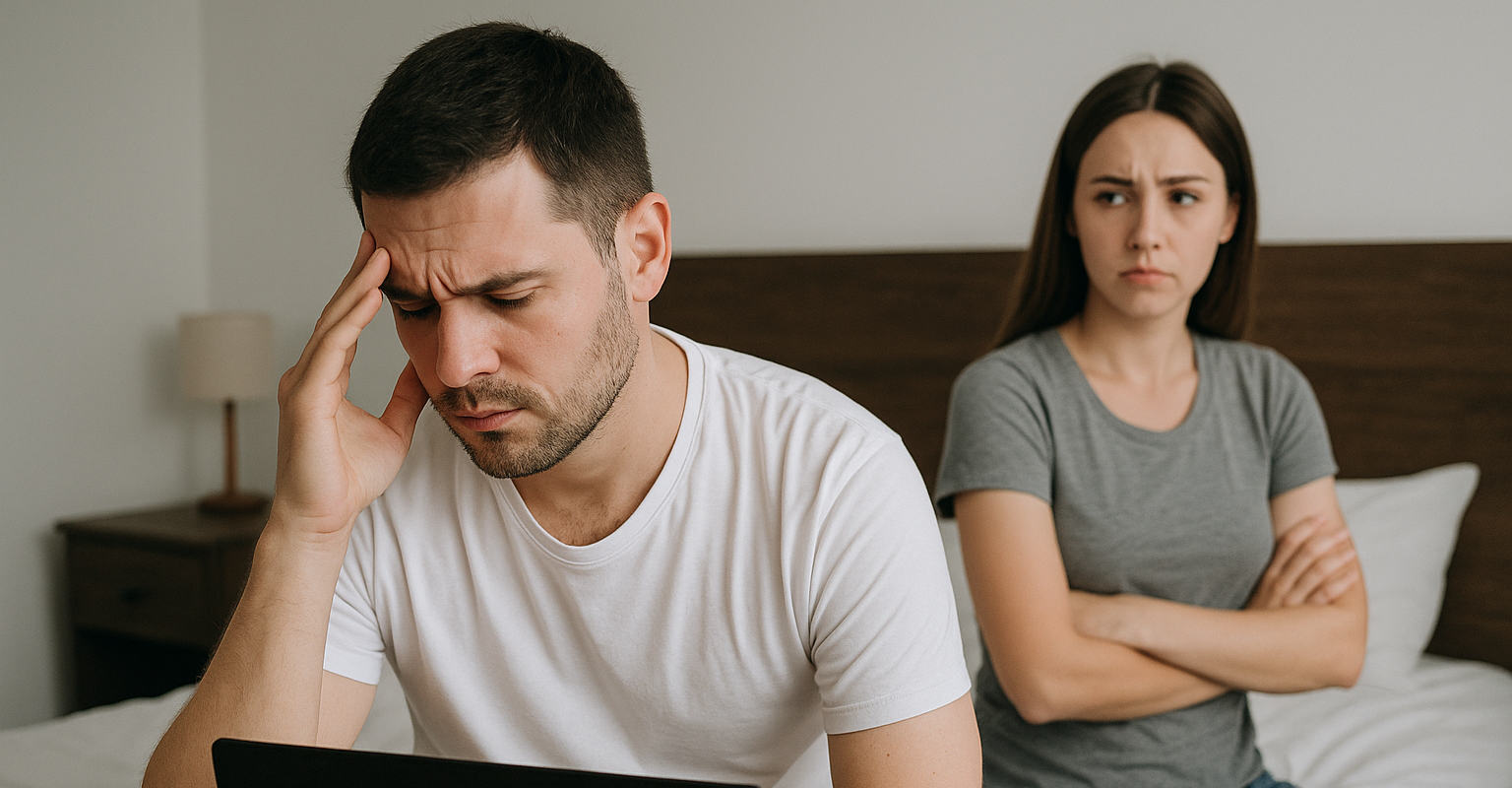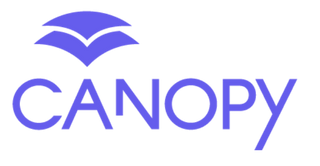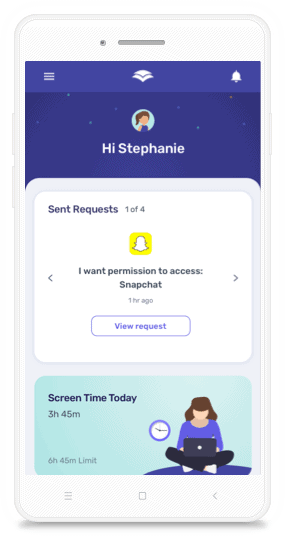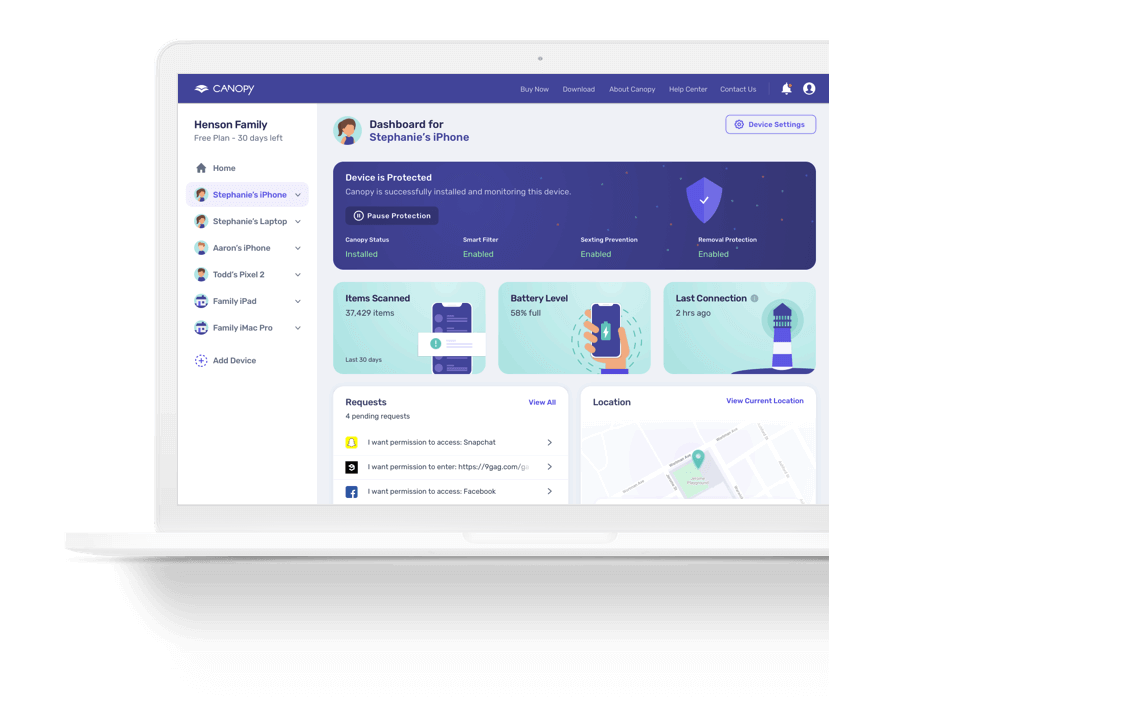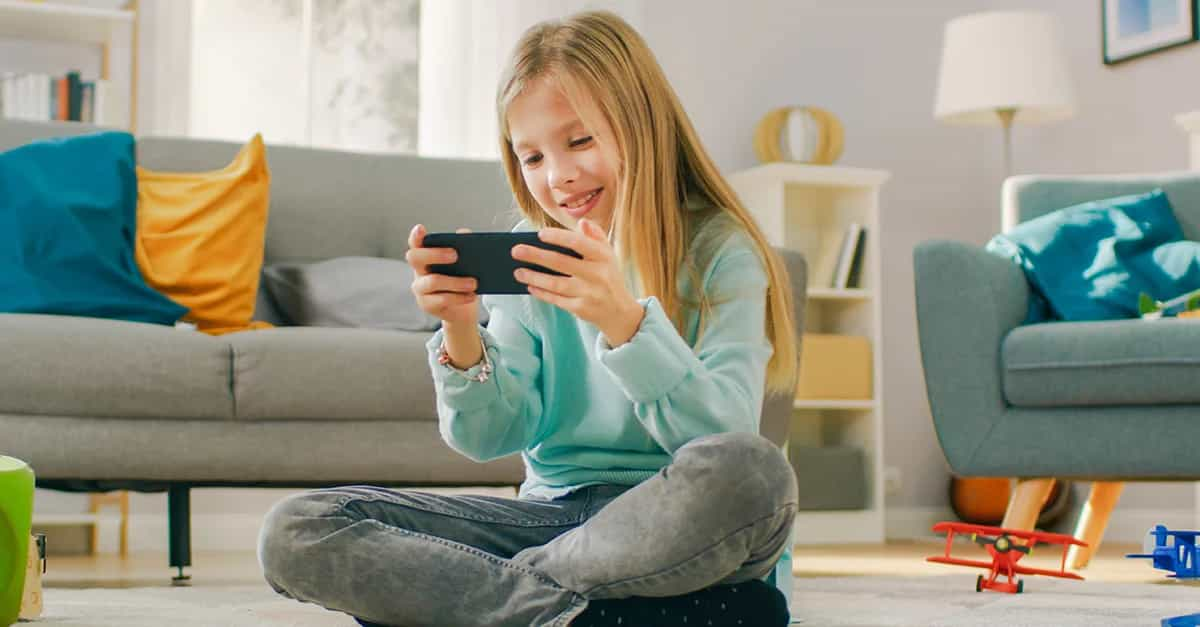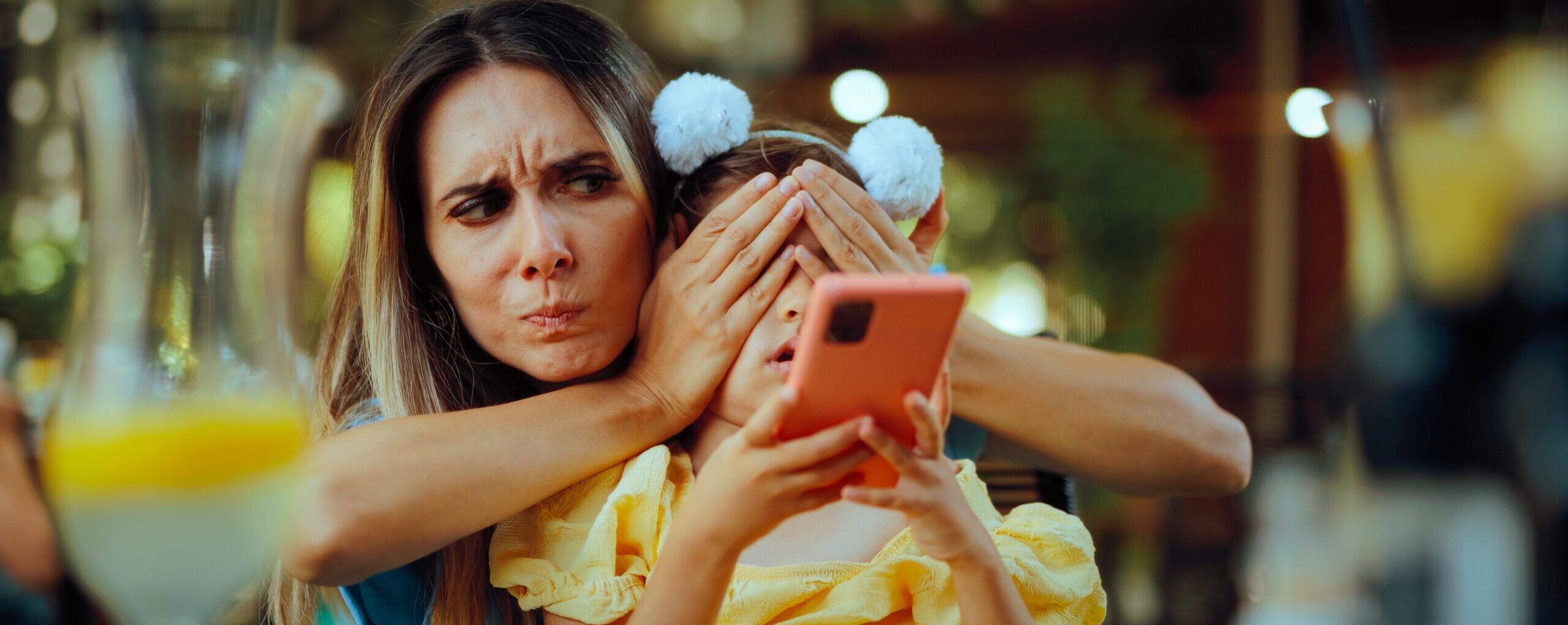Key Takeaways
Porn accountability works best when it is simple, consistent, and built around support instead of shame. The goal is not perfection. It is building a repeatable system that helps you notice triggers, reduce exposure, and make better choices over time.
Porn accountability is a practical commitment to honesty, boundaries, and regular check-ins with someone you trust
The most effective accountability plan includes clear goals, a routine for check-ins, and a way to handle slips without spiraling
A strong system reduces easy access by adding friction, like content filtering or blocking, especially during high-risk times
Digital tools can support porn accountability by limiting exposure and making it harder to “browse just a little”
Canopy for Adults supports porn accountability with real-time explicit content filtering, and Ally adds a trusted partner who can help manage your protection and keep you on track
What does porn accountability really mean?
At its core, porn accountability means being honest, first with yourself, and then with at least one other person, about how porn is affecting your life, and what you’re actually doing day to day.
Instead of asking “Is watching porn normal?” or “Is porn bad?” in the abstract, porn accountability zooms in on you: your patterns, your emotional triggers, your values, and the gap between what you want and what’s really happening.
Porn accountability includes:
- Tracking when you watch porn, what leads up to it, and how you feel afterwards.
- Identifying triggers like boredom, stress, loneliness, or conflict in your relationships.
- Letting someone you trust see the real picture, not just the version you wish were true.
It’s not a moral scoreboard. It’s a feedback loop. The point isn’t to tally failures. It’s to spot patterns so you can change them.
Good porn accountability is:
- Honest, not perfect. You’re allowed to say, “I slipped,” without fear of being discarded.
- Collaborative, not controlling. You and your accountability partner are on the same side.
- Forward-looking. Each conversation asks, “What did we learn, and what’s the next step?”
When you approach accountability this way, you create a framework that works whether you’re dealing with occasional overuse or full-blown addiction and are actively seeking accountability for porn addiction recovery.

Bringing secrets into the light
Porn thrives in the dark. Hiding your behavior creates a loop of secrecy: Shame leads to more hiding, which leads to more compulsive use.
You might tell yourself it’s “no big deal,” yet still feel defensive if your partner asks about porn in relationships or finds your history. Or you clear your browser and think, “If no one ever finds out, it doesn’t really count.”
Secrecy has a cost:
- It keeps you isolated. You’re alone with your guilt, your cravings, and your confusion.
- It distorts reality. When no one else sees the pattern, it’s easier to minimize it.
- It erodes self-respect. Every time you hide, you reinforce the belief that this part of you is unworthy of love or help.
Bringing things into the light doesn’t mean live-streaming your struggles. It means letting one or a few trusted people in.
That could look like:
- Telling a close friend, mentor, or partner, “I’m not okay with how much porn I’m using, and I need help.”
- Starting a private journal where you document urges, slips, and wins.
- Joining an online accountability group where others share their progress and setbacks.
Even the act of writing down the truth (“I watched porn for two hours last night because I was lonely”) weakens shame’s grip. Hiding says, “If they knew, they’d leave.” Accountability says, “If I’m honest, they can actually support me.”
If your porn use is impacting intimacy or trust, this is also the place to learn more about porn in relationships, is porn cheating, and kids watching porn so you can move from secrecy to shared understanding in your home.
Why willpower alone isn’t enough
If you’ve ever white-knuckled your way through a streak, you know that raw willpower has limits.
Porn taps into powerful reward circuits in the brain. Novelty, intense visual stimulation, and endless scrolling all drive dopamine spikes. Over time, your brain can start to link porn with relief from stress, anxiety, or boredom. That’s why you might find yourself clicking without even fully deciding.
When those circuits fire, your logical brain (i.e. your long-term goals, your values, your desire to be present in real-life relationships) gets crowded out by the immediate urge.
Willpower breaks down when:
- You’re tired, stressed, or emotionally flooded.
- You’re alone with a fully open internet and no friction between impulse and access.
- You’ve built strong habits around using porn to cope.
This doesn’t mean you’re weak. It means your system is stacked against you.
Accountability changes the system. When there’s a person, a plan, and a structure in place, the path from urge to action is no longer automatic. You start to notice: “I want to open that site, but I also don’t want to explain this slip in my next check-in.”
Digital tools help too. If you use a porn blocker or learn how to block porn on your phone, you’re not relying only on willpower in the heat of the moment. You’re changing the environment so doing the right thing becomes easier than doing the old thing.
If you’re curious about the science side, it can help to explore what porn can do to your brain so you understand what you’re really up against, and why your brain is capable of rewiring with consistent support.
How porn accountability transforms the recovery process
When accountability becomes part of your everyday life, the recovery process changes in several important ways.
First, temptation gets externalized. Instead of thinking, “I’m a bad person for wanting this,” you learn to say, “I’m noticing a strong urge, and I’m going to talk about it.” You might text your accountability partner or jot a note to discuss later. The urge is no longer an all-or-nothing secret.
Second, you build self-awareness. Regular check-ins, whether with a friend, therapist, or online accountability partner, force you to look at the bigger picture:
- What times of day are hardest?
- Which apps or sites (OnlyFans, Twitter/X, certain subreddits, or even porn on Spotify and Pinterest) pull you in?
- What emotional states (loneliness, anger, exhaustion) show up right before you act out?
The goal isn’t to obsess over data. It’s to notice patterns so you can make smarter changes, like setting boundaries around your phone at night or using tools to block adult content on Instagram, Facebook, or other triggers.
Third, accountability replaces guilt with responsibility. Instead of looping on “I messed up again,” conversations become about what you’ll do next time. Maybe that’s trying alternatives to porn when you’re triggered, changing your bedtime routine, or adjusting your digital safeguards.
Over time, this shift changes how you see yourself. You stop being the person who is “secretly broken” and start being the person who is actively taking steps, no matter how small, to align your actions with your values.
Types of accountability that actually work
There’s no one-size-fits-all porn accountability program. The best setup is the one you’ll actually use. Here are several forms of accountability many adults find helpful, which you can mix and match.
A trusted friend, mentor, or partner
For many, a porn accountability partner is a close friend, mentor, sponsor, or significant other. You agree on the basics:
- How often you’ll check in.
- What you’ll share (for example, number of slips, specific triggers, or daily urges).
- How they’ll respond (encouragement, practical advice, prayer, or simple listening).
This can be powerful because the person knows your life, not just your screen habits. They can spot patterns between stress at work, conflict at home, and temptation online.
Faith or men’s/women’s group
Some people find support in faith-based communities or gender-specific groups. Whether it’s a church recovery group, a men’s group focused on sexual integrity, or a women’s group discussing porn addiction in women, the shared context can reduce shame. You’re surrounded by people who get it.
These groups can function like an online accountability group, an in-person circle, or a mix of both. The key is consistency and honesty, not perfection.
Therapist or recovery coach
If porn use is deeply intertwined with trauma, anxiety, depression, or relationship struggles, working with a therapist or certified recovery coach can add depth and structure. They’re not just an accountability partner; they’re trained to help you untangle the why beneath the habit and build healthier coping strategies.
Digital tools and filters
In a world where explicit content is always one tap away, digital tools are a crucial part of accountability.
- You can learn how to block porn on Chrome, Safari, or your specific device (Android, iPhone, Mac) so you’re not relying on sheer willpower.
- You can use a porn blocker mac app or a tool to block adult content on Twitter/X, Instagram, or other platforms that quietly host explicit material.
- You can use accountability-focused apps that give a trusted person visibility into risky behavior without broadcasting every detail of your online life.
One way to combine these: use strong filtering to reduce exposure, and use targeted accountability to process urges, slip-ups, and growth.
A quick video overview
Want a simple, human explanation of why accountability matters more than willpower? This video is a good starting point to share with a partner, friend, or group:
You can watch it together and use it to spark an honest conversation about what accountability might look like for you.
How Canopy for Adults builds digital accountability into everyday life
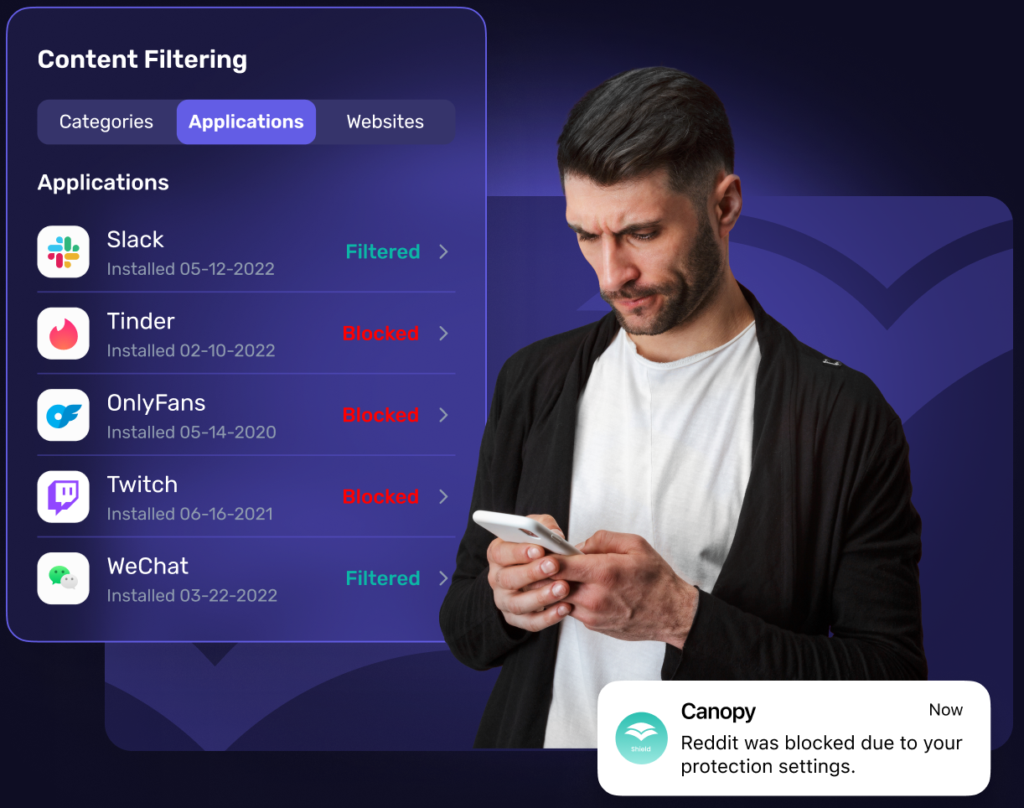
If you’re looking for a practical way to add digital accountability to your plan, Canopy for Adults is designed precisely for this challenge.
Canopy’s real-time AI filtering doesn’t just block known porn sites. It can detect and block explicit content on the fly, across apps, browsers, and search engines. That means it helps you block porn on your phone, whether you’re using Chrome, Safari, or another browser, and it can support you across devices if you use both iPhone and Android over time.
On top of filtering, the Ally feature turns Canopy into a digital accountability partner:
- You choose a trusted Ally, such as a friend, mentor, or partner, who receives gentle, privacy-respecting updates about your digital safety.
- The focus is on patterns and protection, not humiliation or surveillance.
- You still control your devices, but you’re no longer navigating temptation completely alone.
Think of it as online accountability built into the very way you use your devices. Whether you’re recovering from OnlyFans addiction, trying to break late-night scrolling habits, or simply want safeguards in place, Canopy for Adults gives you a solid foundation.
The role of digital accountability in modern recovery
A generation ago, someone struggling with porn might have had to seek it out by going to a store, renting a video, or watching a specific channel. Today, the internet delivers unlimited explicit content in seconds, often for free, on devices we carry everywhere.
That’s why digital accountability isn’t optional anymore. It’s a core part of any realistic plan.
Digital accountability includes:
- Filtering and blocking. Learning how to block porn, how to block adult websites on Google Chrome, how to block porn on Android and how to block porn on iPhone gives you guardrails across devices.
- App-level safeguards. If you’re vulnerable to certain platforms, you can explore how to block adult content on Facebook and how to block adult content on Instagram, or use tools to manage porn on Spotify, Pinterest, and even unexpected places like Google Maps porn search results.
- Time and device boundaries. Screen-time limits, downtime settings, and device-free zones in your home can reduce late-night or alone-time vulnerability.
- Digital accountability partners. With tools like Canopy Ally, an online accountability partner can see when your guardrails are being tested and check in with support.
This isn’t about locking down your life forever. It’s about making sure that when you’re tired, stressed, or triggered, you don’t have to reinvent your boundaries from scratch.
By combining digital accountability with offline support such as a friend, therapist, or group, you’re no longer fighting on two fronts alone.
Building a framework for honest accountability
It’s one thing to say, “I should be more accountable.” It’s another to turn that into a concrete plan. Here’s how to build a framework that feels real, not vague.
Start by choosing one person who knows your journey. That might be a spouse, a close friend, a mentor, or someone from an online accountability group. The key is that they are safe, trustworthy, and committed to your growth, and not just curious about your struggles.
Next, set clear expectations together. Decide how often you’ll check in (daily, a few times a week, weekly), and what you’ll cover. You might agree to share how many days you’ve gone without porn, what triggered any slips, and what you’re experimenting with as alternatives to porn when urges show up.
Create transparency about setbacks from the beginning. Instead of promising, “I’ll never slip again,” agree on how you’ll handle it when you do. For example: “If I relapse, I’ll tell you within 24 hours and we’ll debrief what happened, without blame or drama.”
Then, connect your accountability framework to your digital habits. That might look like:
- Turning on filtering and learning how to block porn on Safari or your preferred browser.
- Using a porn blocker mac app if your laptop is a weak spot.
- Connecting Canopy Ally so your accountability partner has simple insight into your safety settings and changes.
Finally, keep the focus on progress, not perfection. Celebrate small wins: a tough evening you got through without porn, a week where you reached out instead of isolating, a month where your urges started to feel less overwhelming. These are real indicators that your brain and habits are changing.
Rebuilding self-trust through accountability
If porn has been a struggle for a long time, you might not just feel guilty – you might feel unreliable to yourself. You’ve made promises in the past and broken them. You’ve tried to stop watching porn and found yourself back in the same place. That can wear down self-trust.
Accountability is one of the most powerful ways to rebuild that trust.
Every time you choose honesty over hiding, you send yourself a message: “I am someone who tells the truth, even when it’s uncomfortable.” Every time you follow through on a small commitment such as texting your accountability partner, opening the app to review your protection, or joining your online accountability group, you prove that your word still matters.
Over time, something subtle shifts. You stop seeing yourself as “the person who always fails” and start seeing yourself as “the person who keeps showing up.” That identity change doesn’t happen overnight, but accountability accelerates it.
If porn has impacted your relationships, this process also gives you a path to repair. You can talk openly about is porn cheating, how your partner feels, and what rebuilding trust will look like when there’s a concrete system in place, not just another apology.
You don’t have to do this alone. Tools like Canopy for Adults, a thoughtful porn accountability partner, and a clear plan can help you move from shame and secrecy toward dignity, clarity, and real freedom.
Ready to start your own porn accountability plan?
If you’re ready to move from “I hope I stop” to “I’m taking real steps,” here’s a simple way to begin:
- Choose one person to invite into your journey as an accountability partner.
- Put basic digital guardrails in place. Click here to learn how to block porn on your phone and main devices.
- Start a simple check-in rhythm and adjust it as you learn what works.
Canopy for Adults can be a core part of your plan. Our real-time filtering helps keep explicit content off your screens, while the Ally feature gives you an online accountability partner who can walk with you without invading every aspect of your digital life.
Porn Accountability FAQ
What is online accountability?
Online accountability means using digital tools, apps, and relationships to stay honest about your internet habits, especially around sexual content. It can include filters or porn blockers, activity reports shared with a trusted Ally, check-ins with an online accountability group, and agreed boundaries on how you use your devices.
What does “porn accountability” mean?
Porn accountability is the practice of taking responsibility for your porn use instead of hiding it. It involves tracking your patterns, acknowledging how porn affects your mental health and relationships, and inviting at least one trusted person or online accountability partner into the process so you’re not fighting alone.
Why is accountability so important in overcoming porn habits?
Accountability breaks the secrecy that keeps many people stuck. It adds structure and relational support where willpower alone often fails. When someone else knows your goals, your triggers, and your struggles, it’s harder to rationalize “just this once,” and easier to talk about urges before they turn into relapse. It also gives you encouragement when you’re tempted to give up.
